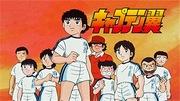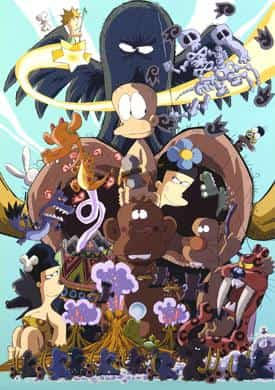Captain Tsubasa: The appeal and reputation of the 1983 original series

Captain Tsubasa: A timeless masterpiece depicting the dreams and passion of soccerThe TV anime series "Captain Tsubasa," which aired from 1983 to 1986, depicts youth, friendship, effort, and growth through the sport of soccer, and its influence has not faded to this day, continuing to fascinate fans around the world. In this article, we will introduce the appeal of "Captain Tsubasa" and provide detailed information about it, and explore why it continues to be loved by so many people. ■Overview of the work"Captain Tsubasa" is a television anime series based on the manga of the same name by Yoichi Takahashi. It was broadcast every Thursday on TV Tokyo from October 13, 1983 to March 27, 1986, and became a long-running series with a total of 128 episodes. It was produced by TV Tokyo and Tsuchida Productions, with Mitsunobu Hiroaki as chief director. The original manga was serialized in "Weekly Shonen Jump" (Shueisha), and its popularity was such that it was not only adapted into an anime, but also spawned four feature films. ■ StoryThe story revolves around the soccer life of Tsubasa Ozora, who transfers to Nankatsu Elementary School in Shizuoka Prefecture. Having been familiar with soccer since childhood and with the belief that "the ball is a friend," Tsubasa walks the path of soccer with good teammates, rivals, and mentors. His genius talent and passion blossoms through national tournaments and European tours, creating many moving scenes. ■Explanation"Captain Tsubasa" can be said to have sparked the current popularity of soccer in Japan. When it was broadcast, it broke the record for the highest audience rating (21.2%) for an anime program on TV Tokyo, and its influence is immeasurable. The original work is a coming-of-age story about a genius soccer boy drawn by Yoichi Takahashi, depicting his exploits from elementary school to junior high school. Its popularity has not waned even after it was made into an anime, and it has been re-animated twice, as "Captain Tsubasa J" in 1994 and "Captain Tsubasa" (Heisei version) in 2001. It is also broadcast in over 50 countries around the world, and many of the world's top players declare themselves to be fans. ■CastThe main characters are voiced by:
■ Main staffThe main staff involved in the production are as follows:
■ Main CharactersDetails of the main characters are as follows: Tsubasa OzoraA boy with a cheerful and positive personality. He has a talent for soccer that could be called a child of the future, and shows outstanding skills such as overhead kicks as an elementary school student and drive shots in junior high school. He can also imitate other players' techniques after seeing them just once. His motto is "The ball is your friend." Taro MisakiA boy with a mature personality and consideration for others. He has traveled around the country with his father, a painter, and belonged to various teams, so he is able to play in combination with other players of any style. After meeting Tsubasa at Nankatsu Elementary School, they became a golden duo. Genzo WakabayashiA goalkeeper who boasts impenetrable defense, he faced off against Tsubasa on their first encounter, and they became rivals as well as sworn allies bound by a strong friendship. Hyuga KojiroNicknamed "The Fierce Tiger," he is a striker full of fighting spirit. As the eldest child of a single-parent family, he strives to become a professional in order to help his family. For this reason, he has no tolerance for those who play soccer with a careless attitude. Ken WakashimazuThe son of a karate dojo owner, he is a goalkeeper who uses his skills to defend the team. He and Kojiro have been friends since they were elementary school students, and they have built a strong bond of trust. Roberto HongoA former Brazilian national team player of Japanese descent who retired due to retinal detachment, he is Tsubasa's most respected mentor. ■SubtitleThe subtitles for all 128 episodes are as follows:
■ Related worksThe "Captain Tsubasa" series includes the following related works:
■ Theme songs and musicThe theme songs and insert songs for "Captain Tsubasa" are as follows: Opening Theme
Ending Theme
■ Evaluation and impact"Captain Tsubasa" is not only an appealing story and characters, but has also contributed greatly to the spread of the sport of soccer. It is known as the work that sparked the rise of soccer in Japan in particular. When the anime was first broadcast, it is said to have inspired many children to take up soccer and become professional soccer players. It has also been highly praised overseas, broadcast in over 50 countries around the world. Its influence is such that many professional soccer players publicly declare that they are fans of "Captain Tsubasa." The work has been praised for its realistic and moving story development and character growth. In particular, the story of Ozora Tsubasa's growth has resonated with many viewers, teaching them the importance of hard work and friendship. Additionally, scenes depicting confrontations with rivals and the importance of teamwork left a strong impression on viewers. ■Reasons for recommendation"Captain Tsubasa" is recommended not only for those who love soccer, but also for those who want to enjoy a story about youth, friendship, and hard work. It is especially recommended for the following people:
■How to watchCaptain Tsubasa is available to purchase on DVD and Blu-ray. It is also available on streaming services. You can watch it on the following services:
You can also enjoy the world of "Captain Tsubasa" more deeply by watching related works and remakes. In particular, the movie version and remakes "Captain Tsubasa J" and "Captain Tsubasa (Heisei version)" are a good opportunity to rediscover the appeal of the original work. Conclusion"Captain Tsubasa" is a timeless masterpiece that depicts youth and friendship, hard work and growth through the sport of soccer. Its influence has spread not only in Japan but all over the world, and it continues to inspire and encourage many people. It is a work that can be recommended to a wide range of people, including those who love soccer, those who like youth dramas, those who like sports anime, and those who like stories of hard work and growth. Please watch "Captain Tsubasa" and experience its charm for yourself. |
<<: Igano Kabamaru: Reevaluating a nostalgic anime classic
Recommend
Meine Liebe Wieder - A thorough review of the fascinating story and character depth
Meine Liebe wieder - Reunion of Youth and New Cha...
Bethesda has previously rejected several proposals for film and television adaptations of "Fallout"
The live-action TV adaptation of "Fallout&qu...
Tom Cruise insists on Val Kilmer returning to play Iceman in Top Gun 2
"Top Gun: Maverick" producer Jerry Bruc...
"Venom: The Last Dance" 3DM offline viewing ended successfully!
The free offline viewing event of the "Venom...
Rumor has it that Tom Cruise will play a variant of Iron Man in Avengers: Doomsday
According to foreign media bamsmackpow, Marvel is...
The appeal and reviews of Tomica Heroes Job Labor Special Combination Robot: An action-packed work that can be enjoyed by both children and adults
Tomica Heroes Job Labor Special Combined Robot - ...
Marvel officially announced! The Russo brothers returned to direct "Avengers 5" and "Avengers 6". Robert Downey Jr. returned to MCU
10:16 Update Marvel Studios official blog release...
The appeal and evaluation of Bikkuriman 2000: The beginning of a new legend
Bikkuriman 2000 - A comprehensive guide to Bikkur...
Actress Letitia Wright recovers from injury, filming of "Black Panther 2: Long Live Wakanda" is on hold
According to hollywoodreporter, the filming plan ...
It's really Children's Day. It's Tom Holland's birthday today.
"Little Spider" Tom Holland celebrates ...
Action film "Daho Warrior Beauty" is scheduled to be released nationwide on April 14
The Hollywood action blockbuster "Daho Beaut...
Shen Teng and Ma Li's sci-fi comedy "The Moon Walks Alone" wrap-up stills and set photos released for the first time
Directed by Zhang Chiyu and starring Shen Teng an...
The animation "Journey to the West: The Living Demon King" was moved up to April 2, Qingming Festival
According to the news released by @"Journey ...
Hollywood Reporter: Pac-Man to get live-action movie adaptation
As games become more popular around the world, mo...
"Justice League" director's cut version of the mother box origin trailer six giants presented in a new form
Today (February 28), Zack Snyder released a new &...









